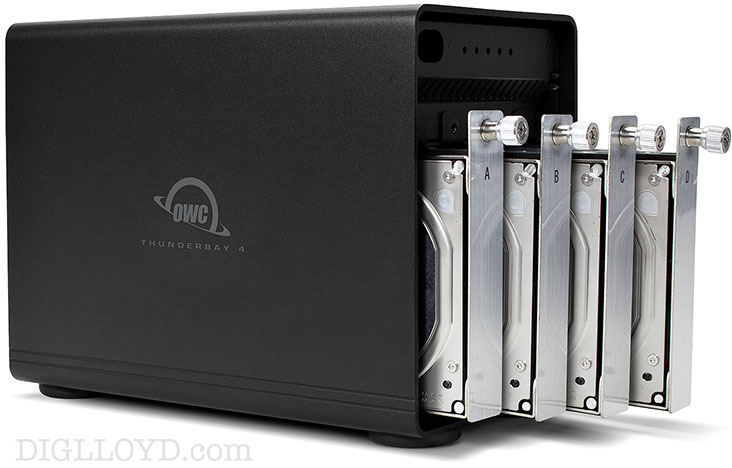
$220 SAVE $130 = 37.0% Western Digital 16.0TB Western Digital Ultrastar DC HC550 3.5-in… in Storage: Hard Drives
|

|

|

|

|

|

|

|

|

|
Crucial 128GB solid state drive (SSD)
Related: 4K and 5K display, Apple macOS, computer display, diglloydTools, DiskTester, eSATA, hard drive, Mac Pro, memory, Photoshop, RAID, RAID-0, SSD, storage
August 08, 2009
For background information on solid state drives, see the Solid State Drive Overview and also How to Make Your Mac Feel Lightning-fast and Intel X25-M in a Mac Pro.
This review is based on relatively brief testing. Any findings with extended use necessarily take time to emerge. However, based on eight months of intensive daily usage of the Intel X25-M as a boot drive, this testing assessed the Crucial offering in light of previously understood SSD issues. Four drives were tested, single and in RAID.
Pricing
The Crucial 128GB model is available for around $320 (street). Pricing on similar drives like the Intel X25-M 80GB should be similar, making the Crucial 128GB offering a very good value. View prices on SSD
Rated speed
The Crucial 64/128/256GB models are rated at different speeds, high capacity models are faster. The 128GB model tested here is rated at 250MB/sec for reads, and 190MB/sec for writes.
Note that the 256GB model is rated a smidgen faster for writes, at 200MB/sec, an insignificant difference.
Even the 64GB model is capacious enough for a boot drive in a Mac Pro, with appropriate separation of system/applications from data. And it’s still very fast.
Formatted capacity
A 128GB drive formats to about 119GB (Mac, where GB = 1024 X 1024 X 1024). Avoid using all that space— internal fragmentation on an SSD is an issue.
Appropriate uses
Until proven otherwise, use of an MLC-based drive like the Crucial, X25-M, etc is inappropriate for intensive writes eg a Photoshop scratch volume, unless one plans to regularly recondition the drive.
Resistance to internal fragmentation (!) PERMALINK
The Intel X25-M first generation requires reconditioning on a periodic basis, as do many other SSD drives, a serious drawback.
Beat it up
To determine whether the Crucial units have similar drawbacks, DiskTester was used to beat it up for several hours, using the run-random command with 64K blocks after first creating several million 64K files. That kind of usage is not likely to be seen in any normal desktop usage and it’s a worst-case scenario for solid state drives. Initially, the Crucial passed with flying colors. A subsequent fill-volume test showed a moderate 20% slowdown over about half the drive, with a subsequent test showing performance right back to normal— impressive it seemed.
Bad hangover
The next day, one drive was used for a few hours as a boot drive on a MacBook Pro. Subsequent to that, it was erased in preparation for another test, and performance plummetted to as low as 47MB/sec for about 10% of the drive capacity. It required reconditioning to raise its speed back to reasonable levels. Even after doing so, write and read performance remained impaired at about 160MB/sec (down from 190MB/sec).
All four units were brand-new, 5-day old drives. What happens in six months?
The graph below shows just how bad the problem is. Write speed was impaired by 16%, and read speed on about 29% of the volume was severely impaired, running at 78MB/sec instead of 260MB/sec. These speeds are after 3 reconditioning passes over the drive. One more reconditioning pass did do the trick, restoring consistent read and write peformance. But having to erase the entire drive to recondition it is major headache if you’re using it for storage!
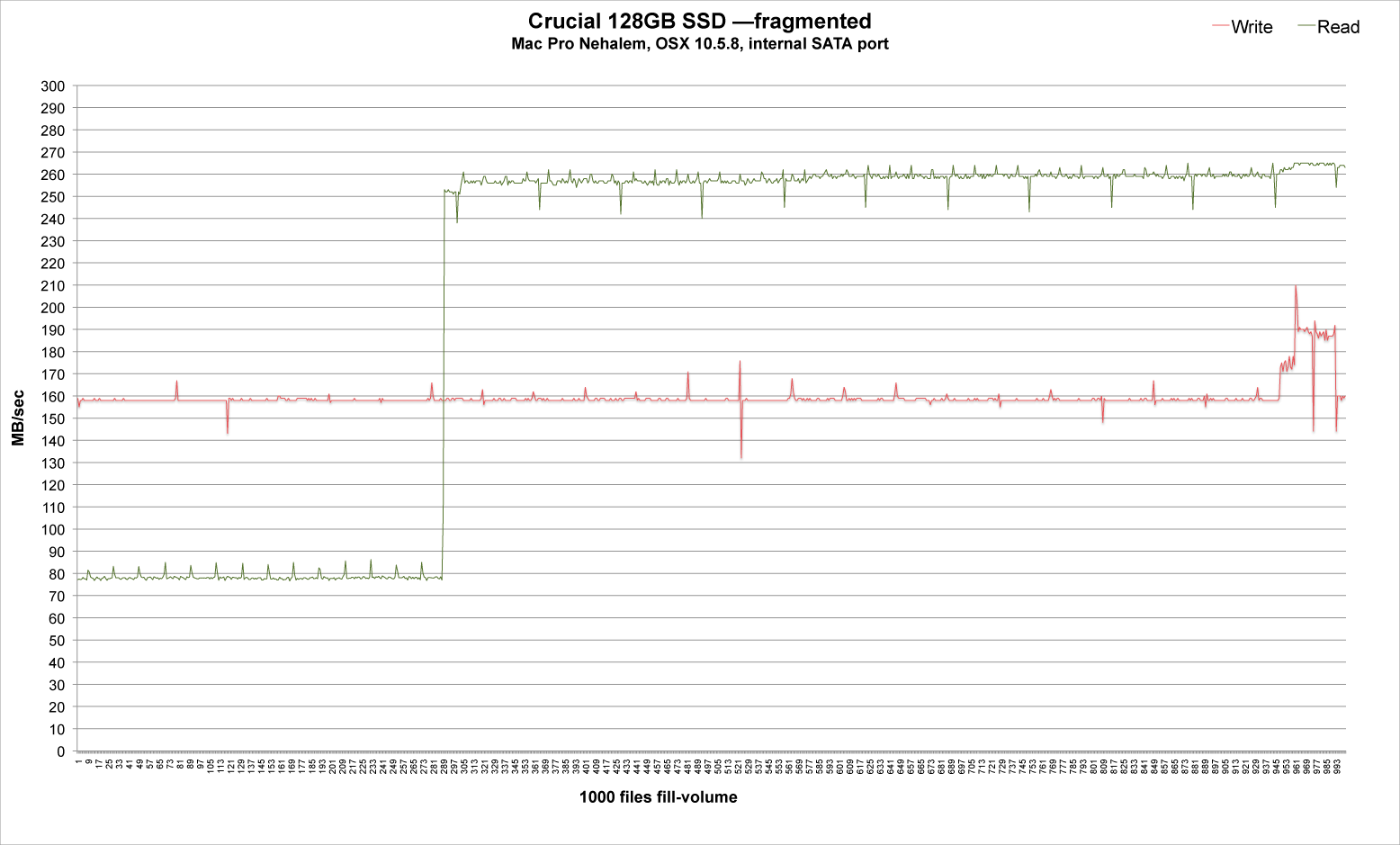
Write speed is impaird by 16%, and read speed of ~1/3 of the dive severely reduced
Retest — not good and worse
All 4 drives were installed in Icy Dock enclosures, and inserted into the four standard drive bays of the Mac Pro Nehalem (boot drive was on another hard drive).
Testing all four drives again showed write speed of all four drives dropping into the 160MB/sec range, substantially below the 190MB/sec they delivered as new drives. Even worse, the read speed show severe impairment on two drives, dropping as low as 76MB/sec for the first 6GB of one drive. That’s a 70% reduction in speed! By comparison, the Intel X25-M even when badly fragmented for writes showed very little read-speed degradation.
During this testing, one (perhaps two) of the drives went AWOL, hanging DiskTester and the Finder, and requiring a hard reboot (pull the power plug). This corrupted at least one program’s preference files.Those are the facts, readers can make their own judgments. This can happen once in a while with hard drives. It only happened once.
High capacity, high-performance fault-tolerant storage for photography and video.
Non-RAID or RAID-0/1/4/5/10.
Capacities up to 72 Terabytes!
RAID could be a bad thing for SSD health
A striped RAID setup plays to the weak spot of SSD drives: since SSDs generally write entire 512K byte blocks internally, any write to a 4-drive stripe must be 2M, 4MB, 6MB, etc to avoid fragmenting an SSD block. With a 2-drive stripe, 1MB, 2MB, etc writes would be needed. Such larger writes are not very common, which means that striping SSDs will likely cause ongoing internal fragmentation. Furthermore, Photoshop CS4 has a habit of writing scratch data in 1MB + 3K chunks, meaning that every single write fragments at least one SSD block, even without a striped RAID.
Internal defragmentation
The Crucial “Indilinx” technology reportedly handles internal fragmentation very well, and reportedly the firmware can garbage-c0llect automatically. It’s clear that the Crucial drives do not have this crucial firmware, and it’s unclear whether there will be a firmware upgrade to address the issue..
Photoshop — huge files PERMALINK
Please see Optimizing Photoshop for background material. This test used the diglloydHuge benchmark. When working with really huge files in Photoshop, this is the test you want to pay attention to!
Worth noting is that Mac OS X 10.5.8 is faster than 10.5.6 (see prior results in Optimizing Photoshop). Upgrade immediately if you’re a Photoshop user with Mac OS X 10.5.x.
The hard drives used here were the 1TB Western Digital RE-3, the same units used in Optimizing Photoshop.
The four-drive SSD option is superior to four hard drives, but only by about 10%. This is surprising, since the SSD RAID-0 stripe is about twice as fast as the 4-drive hard-drive stripe. Why the difference? Probably Photoshop was never written expecting this kind of drive speed, and so Photoshop itself has internal bottlenecks that limit performance (it is definitely not a CPU speed issue, CPUs are largely idle for this test).
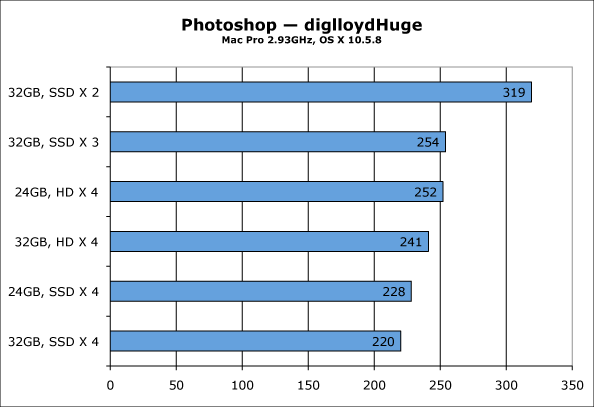
Other points
There are only modest variations in speed here; stick with 24GB memory and four fast 1TB hard drives unless you must have the very fastest machine.
- Four drives is best, whether hard drives or SSD;
- Using four SSDs for a scratch drive reduces the 24GB vs 32GB memory disparity to only about 4%;
- Using 32GB versus 24GB makes very little difference when SSDs are used for the scratch volume;
- Be sure to understand the test setup with eSATA cards!
- Behavior could change with Mac OS X 10.6 (Snow Leopard), and definitely will change when Adobe releases a 64-bit Photoshop CS5.
Value proposition
Contact me for a consultation to discuss your particular needs.
The value proposition is challenging with SSD. The Photoshop results show that performance is only about 15% better with huge files, as compared with the hard drive approach.
With four 1TB hard drives, a 4-drive RAID-0 scratch volume is nearly as fast, and even after making the scratch volume, you still have a generous 3.4TB of extra storage for your files.
With the SSD approach, you’ll have to figure out how to get the storage you need and the SSDs at the same time. In my test setup, I resolved that by installing the four SSDs in a FirmTek SeriTek case, but that also required two Sonnet E4P eSATA cards (see Test Setup for details).
Pimp your Mac Pro
For the fastest Photoshop workstation for huge files, go with 32GB memory and four SSDs in a RAID-0 stripe. For anything of reasonable size that setup will be overkill, but it certainly won’t hurt.
View a cart containing the required hardware for the SSD approach.
For most users, the four-hard-drive approach (using the four Mac Pro internal drive bays) is far more cost-effective, since capacious storage is a huge plus; the SSDs essentially are an additional extra for many users. See internal hard drives at OWC. For the hard-drive approach, you’ll want to boot off an internal SSD (to free up those drive bays).
Performance summary PERMALINK
Read and write speed is fairly symmetric, unlike the Intel X25-M, a nice breakthrough.
Sustained write speed is blindingly fast. While not as fast as read speed, it is about 2.5X the speed offered by the Intel X25-M, an enormous difference that should the Crucial SSD . Indeed, its write performance is on par with the enterprise-grade Intel X25-E (and at far lower cost). But that is not to say that with sustained use it would be a match for the X25-E, which is designed for continuous use in a server.
Performance with eSATA
Performance shows a periodic hiccup for write speed, and somewhat erratic read speed. This doesn’t necessarily indicate a problem, and the write periodicity isn’t too unlike the Intel X25-E.
The graph below shows MB/sec while filling (writing) the entire capacity with 1000 equal-sized files (about 121MB each). See Test setup below.
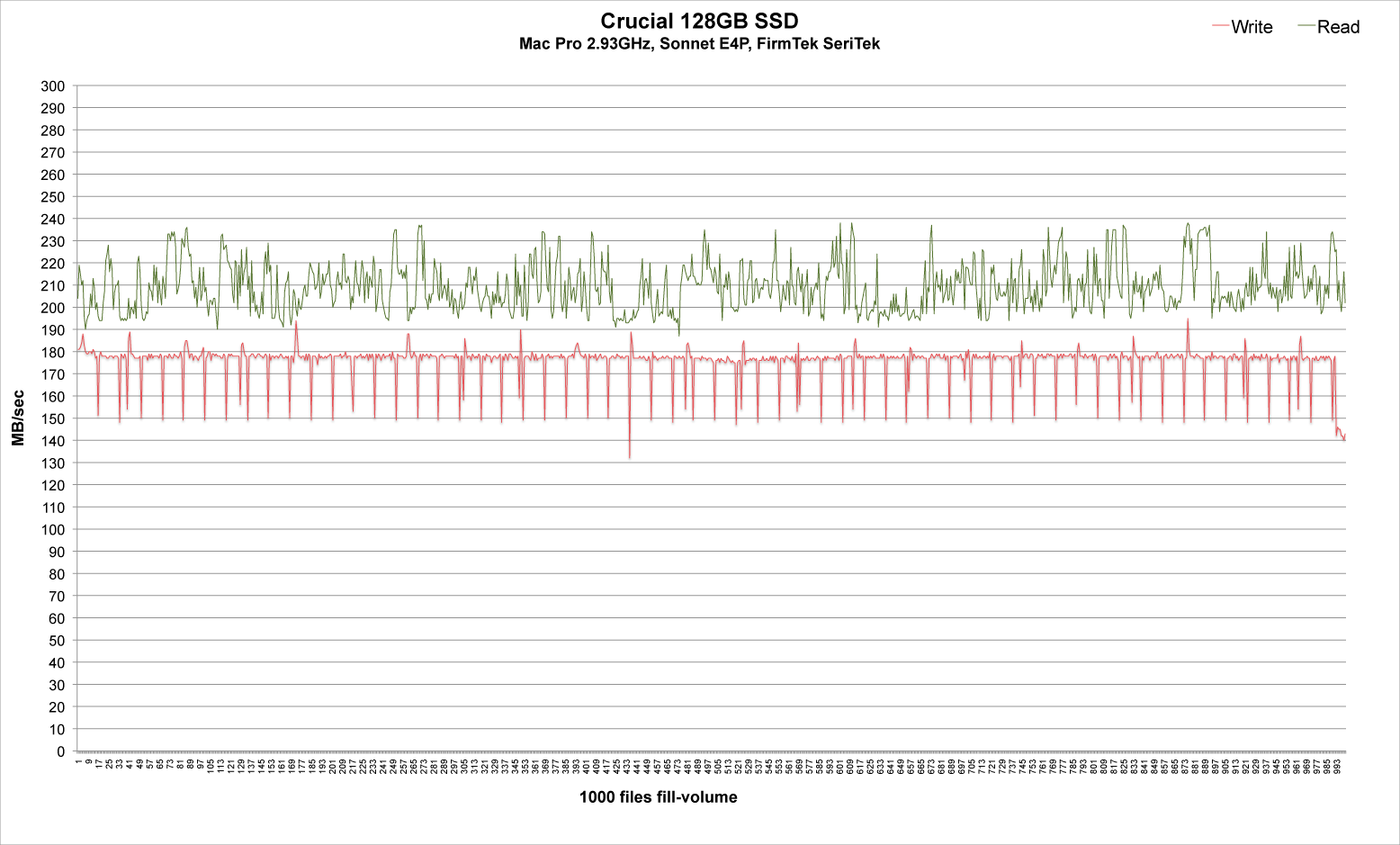
Internal SATA port
After doing all the testing with eSATA, I plugged one of the units into the lower optical bay of the Mac Pro Nehalem. Wow! The read speeds really jumped up, to around 260MB/sec. With an SATA theoretical limit of 300MB/sec, this is darned fast. Write speed is also superb, right at the rated speed of 190MB/sec.
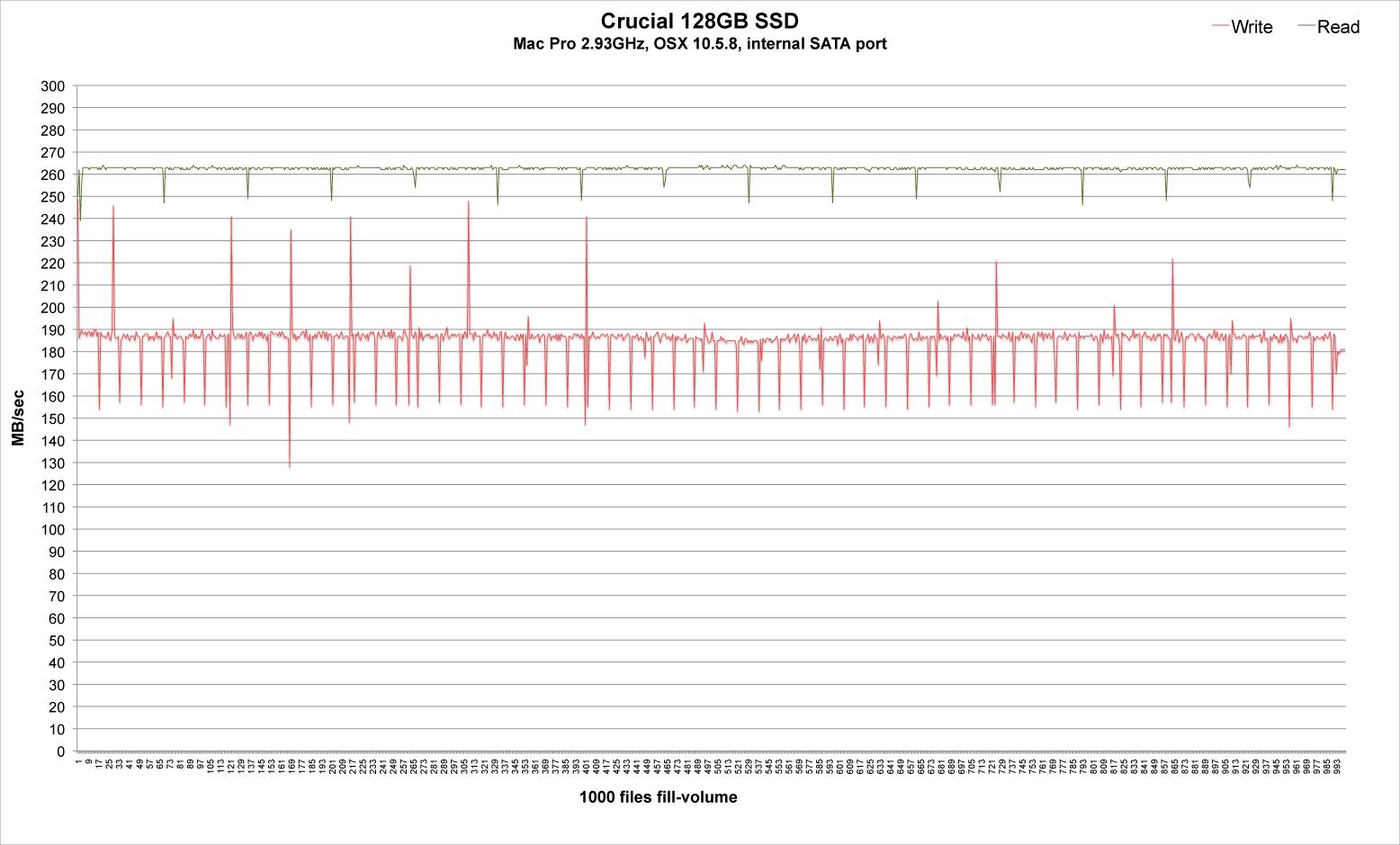
Performance in a 4-drive striped RAID (eSATA)
Performance with 4 drives in a striped RAID-0 scales more or less linearly— a great performance! An average speed of about 800MB/sec is achieved for reads, and about 700MB/sec for writes—stunning. This bodes well for the future, where a Mac Pro system could rely entirely on large SSD drives— fast, silent, and low-power.
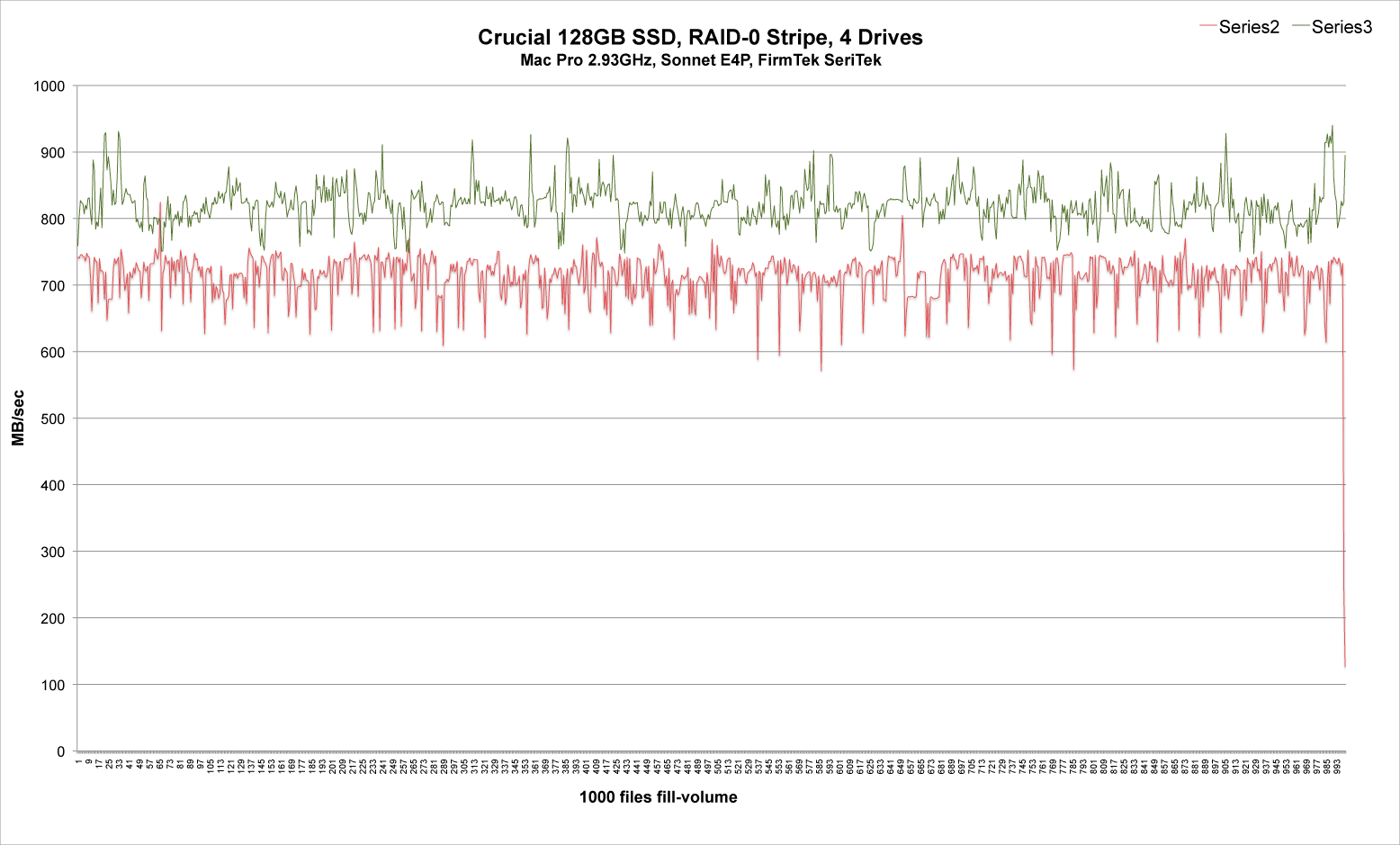
Performance for different transfer sizes
Performance varies with the transfer size. Test results here from disktester run-sequential-suite -s 32K -e 256M --iterations 10, using the 4-drive RAID-0 stripe.
Observe that full speed is realized only with transfer sizes of 1MB or larger. Programs foolish enough to write small chunks of data aren’t going to benefit from the speed of RAID. In fact, RAID speed is slower for small transfers, as seen below.
4-drive RAID-0 stripe --- Averages for "cx4" (512MB/start, 10 iterations) --- Chunk Size Write MB/sec Read MB/sec 32K 132 57.5 64K 149 93.8 128K 301 195.9 256K 490 520.2 512K 531 573.6 1MB 626 700.4 2MB 685 730.8 4MB 694 697.3 8MB 691 722.2 16MB 698 725.6 32MB 712 720.6 64MB 723 729.2 128MB 736 748.9 256MB 700 724.5 Single drive --- Averages for "c1" (512MB/start, 10 iterations) ---
Chunk Size Write MB/sec Read MB/sec
32K 141 148
64K 163 183
128K 151 167
256K 169 188
512K 177 197
1MB 177 194
2MB 182 207
4MB 181 198
8MB 182 206
16MB 182 208
32MB 182 207
64MB 174 197
128MB 175 201
256MB 181 205
Test setup
I tested four (4) individual samples of the Crucial 128GB model, both individually and as a 4-drive striped RAID. The samples were provided on loan from Other World Computing.
Each drive was installed in any IcyDock 2.5" to 3.5" drive tray, and drives were inserted into a FirmTek SeriTek 2eEN4 enclosure, one eSATA cable per drive (no bridge board or PM, just max-speed eSATA). Dual Sonnet E4P eSATA cards were used for each pair of drives, to ensure adequate bandwidth.
Sample variation
The four drives were mostly consistent, but one sample tested significantly faster than the others.
Shown here is the entire-volume average for write and read speed, as determined by using disktester create-files --num-files 1 --file-size 118GB (creating a single 118GB file writing in 32MB chunks, an optimal case).
The samples show a speed variation of about 7% for writes, and about 6% for writes. Three of the four samples did not meet the rated speed of 190MB/sec for writes, and one of them did not meet the rated speed of 200MB/sec for reads. Performance might well vary with use on other eSATA cards, or on the internal Mac Pro drive bays.
Sample 1: 182, 206 Sample 2: 184, 209 Sample 3: 196, 205 Sample 4: 182, 197
Conclusions and recommendations PERMALINK
The four Crucial SSD drives used for testing were supplied by our site sponsor, Other World Computing. OWC is a great vendor to work with, so please give them your business. The 90-day drive replacement guarantee is a big plus, too. View prices on SSD
The Crucial 128GB solid state drive is an outstanding performer at an aggressive price point, a mid-2009 breakthrough in price/performance and to some extent capacity (256GB model). Long term performance and reliability is an unknown, but the initial experience raises some serious question about long term performance and reliability.
Assuming those flaws are worked out —
The Crucial 128GB SSD would be a terrific choice as a boot drive in a Mac Pro,which allows using all four internal drive bays for data.
MacBook Pro (laptop) users should also be taking a close look at the SSD option for reliability reasons, especially anyone traveling frequently, or working at high altitude, etc.
Anyone needing the very fastest possible drive speed should be looking hard at a 4-drive RAID-0 stripe, weighing the storage capacity and cost issues appropriately.
The long-term need to recondition the Crucial 128GB drive as needed with the first-generation Intel X25-M has yet to be observed; it might or might not emerge as an issue.
Want to incorporate SSDs into your system? Contact me for a consultation to discuss your particular needs.
Seagate 22TB IronWolf Pro 7200 rpm SATA III 3.5" Internal NAS HDD (CMR)
SAVE $100

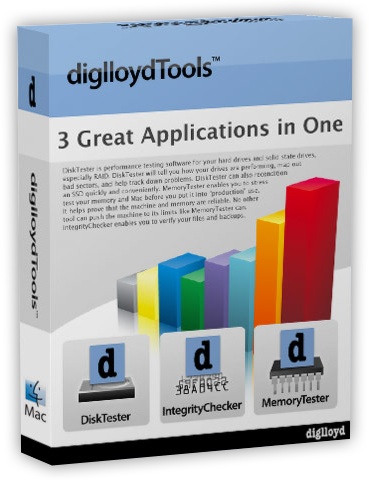 diglloydTools™
diglloydTools™

